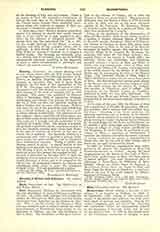

Blomevenna, PETER (PETER A LEYDIS), a Carthusian, b. at Leyden, in Holland, in 1466; d. September 30, 1536. Owing to the avarice and cruelty of his parents and relatives, his early years were spent in poverty and hardship. But he led withal a singularly pure and devout life. Entering the Carthusian Order, he distinguished himself by his absorption in heavenly things and his zeal for the glory of God. In 1506 he was elected prior of the Carthusian monastery of Cologne, a post which he held until his death, twenty-nine years later. His long term of office enabled him to do much to promote strict religious observance both in his monastery and throughout the Rhenish province, of which he had been named visitor. Besides his active work among his brethren, he found time for the composition of several treatises which have a certain value as ascetic and controversial literature. In his “Enchiridion Sacerdotum” (1532) he enlarges upon the august mystery of the Holy Eucharist. His “De Bonitate Divina” is a valuable work for preachers of the word of God. In 1513 he translated into the Latin tongue the Franciscan De Herp’s ascetic treatise “Directorium Aureum Contemplativorum”, adding thereto explanatory notes. He also edited several volumes of Denis the Carthusian (Dionysius of Rickel) and wrote vigorously against the then nascent Protestant heresy. Among Blomevenna’s controversial works are “Candela Evangelica” (1536); “Assertio Purgatorii” (1534); “De Auctoritate Ecclesiae” (1535); “De Vario Modo adorandi Deum, Sanctos et eorum Imagines” (1535).
E. J. DEVINE

